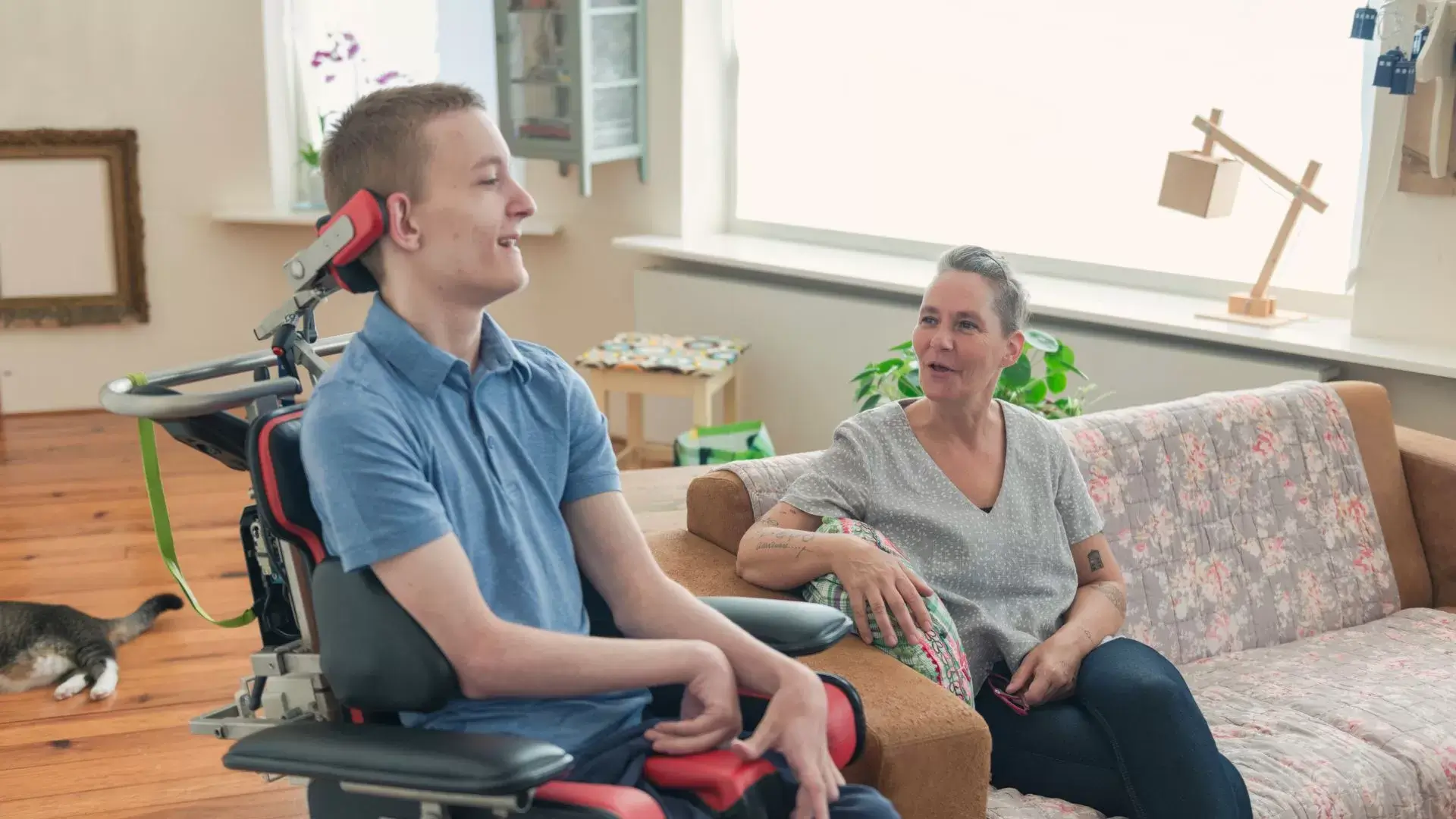We specialize in physiotherapy for neurological conditions, understanding the profound impact these disorders have on mobility, cognition, and emotional well-being. Our personalized treatment plans are designed to enhance recovery and promote independence, whether it’s following a stroke, managing neurodegenerative diseases, or addressing balance issues. We focus on targeted exercises to boost strength and coordination, while also fostering neuroplasticity. Our compassionate approach aims to improve overall quality of life. Engaging in integrated and holistic methods, we guarantee our clients’ needs are met, and we invite you to explore how we can support your journey towards recovery.

At Physio Chiro Clinic, we offer extensive physiotherapy and chiropractic services tailored to meet the unique needs of individuals with neurological conditions. Our expert team understands the complexities associated with neurological rehabilitation and is dedicated to providing personalized neurological treatment plans. We focus on helping patients recover from nerve damage caused by a range of conditions, including spinal cord disorders, multiple sclerosis, and Parkinson’s disease.
Our physiotherapy sessions aim to enhance mobility, strength, and overall function, empowering individuals to regain independence in their daily lives. We utilize evidence-based techniques to address specific challenges linked to each neurological diagnosis, ensuring that our approach is both effective and compassionate.
In addition to physiotherapy, our chiropractic services play an essential role in managing spinal alignment and promoting overall well-being. We believe that a holistic approach is vital for those facing neurodevelopmental disorders and other neurological challenges.
Together, we work closely with our patients, fostering an environment of support and understanding. Our goal is to create a thorough treatment program that not only addresses physical symptoms but also uplifts the spirit, helping individuals navigate their journey toward recovery.
Understanding neurological conditions requires recognizing their profound impact on individuals’ physical, emotional, and social well-being. These nervous system disorders, including brain disorders like stroke, traumatic brain injury, and neurodegenerative diseases such as motor neuron disease, greatly alter lives. Conditions like cerebral palsy and dementia can lead to a range of neurological symptoms, affecting mobility, cognition, and emotional health.
As a collective, we must acknowledge that individuals facing these challenges often experience difficulties with balance and coordination, leading to a decreased quality of life. The emotional toll of living with these conditions can also be considerable, as affected individuals and their families navigate feelings of frustration, isolation, and uncertainty.
Moreover, the social implications can be profound; many may struggle to maintain relationships or participate in activities they once enjoyed. Understanding the multifaceted impact of these conditions helps us empathize with those affected, guiding us in our approach to support and treatment. By fostering a compassionate environment, we can better address the unique needs of each individual, paving the way for improved outcomes and enriched lives despite the challenges of neurological conditions.
Physiotherapy plays an essential role in enhancing the recovery and functioning of the nervous system for individuals with neurological conditions. By employing targeted exercises and interventions, we can help manage symptoms such as paralysis and cognitive impairments. One key aspect of our work is promoting neuroplasticity, the brain’s ability to reorganize itself, which is fundamental for recovery.
In conditions like spinal muscular atrophy or sensory processing disorders, physiotherapy not only addresses physical limitations but also contributes to overall wellness. We focus on reducing neuroinflammation and enhancing the functioning of the autonomic nervous system, which plays a critical role in regulating involuntary bodily functions.
Through tailored treatment plans, we facilitate movement, improve strength, and enhance coordination, fostering independence in daily activities. Our compassionate approach guarantees that individuals feel supported throughout their journey. By integrating various therapeutic techniques, we aim to empower those facing neurological challenges, helping them regain control over their lives and improve their quality of life. Ultimately, our commitment to advancing the understanding and treatment of neurological conditions allows us to provide the best possible care for our patients.
Rehabilitation for stroke and traumatic brain injuries (TBI) is vital in helping individuals regain lost functions and adapt to their new circumstances. In our practice, we focus on a multidisciplinary approach that includes physiotherapy, neuropsychology, and the use of neuroimaging to tailor rehabilitation plans to each patient’s unique needs.
After a stroke or TBI, individuals often experience challenges such as dizziness, vertigo, and neuropathy, which can hinder recovery. Our physiotherapy interventions aim to improve mobility, strength, and coordination while addressing these issues. We guide patients through exercises designed to enhance balance and reduce the risk of falls, which is essential for safety and independence.
Moreover, we work closely with neuropsychologists to support cognitive rehabilitation, helping patients regain memory, attention, and problem-solving skills that may have been affected by their injuries. By fostering a supportive environment, we encourage patients to stay motivated and engaged in their rehabilitation journey. Ultimately, our goal is to empower individuals to reclaim their lives post-stroke or TBI, enhancing their quality of life and overall well-being through extensive and compassionate care.

Managing neurodegenerative diseases requires a proactive approach to maintain mobility, strength, and overall quality of life for those affected. In our practice, we utilize physiotherapy and chiropractic services tailored to individual needs, particularly for conditions like amyotrophic lateral sclerosis and Alzheimer’s disease. These therapies focus on preserving function and enhancing well-being.
For patients with neurogenetic disorders or essential tremor, we develop personalized exercise regimens aimed at improving coordination and reducing stiffness. Our physiotherapy interventions also address chronic issues like fibromyalgia, sleep disorders, and chronic fatigue syndrome, helping individuals regain control over their bodies and daily activities.
We understand that migraines can complicate these conditions, so we incorporate relaxation techniques and posture training to alleviate discomfort. By providing a supportive environment, we empower individuals to engage in their rehabilitation actively.
Ultimately, our goal is to foster resilience and independence in those facing neurodegenerative challenges. By combining targeted physiotherapy with compassionate care, we endeavor to enhance the quality of life for our clients, ensuring they receive the best possible support in their journey.
For individuals experiencing peripheral neuropathy and other nerve disorders, targeted therapeutic interventions can greatly enhance mobility and reduce discomfort, complementing the strategies we implement for neurodegenerative diseases. In our practice, we focus on specific conditions like radiculopathy, carpal tunnel syndrome, and restless legs syndrome, tailoring physiotherapy to meet each patient’s unique needs.
We understand that neuropathies can lead to symptoms such as paresthesia, weakness, and pain, which can greatly impact daily life. Through structured neurorehabilitation programs, we aim to alleviate these symptoms and improve functional outcomes. Our physiotherapy techniques may include manual therapy, strengthening exercises, and modalities like electrical stimulation to promote nerve healing and enhance muscle activation.
For those with myasthenia gravis or other complex nerve disorders, we emphasize gradual progression and careful monitoring of fatigue levels. Our compassionate approach guarantees that we create a safe environment, allowing patients to regain confidence in their mobility. By addressing each individual’s challenges, we endeavor to empower our patients, helping them navigate their journey toward improved function and quality of life.
Addressing balance and mobility issues is essential for enhancing the overall quality of life for individuals with neurological conditions, and our physiotherapy approach focuses on personalized strategies to improve stability and confidence in movement. We recognize that conditions like muscular dystrophy, ataxia, Guillain-Barré syndrome, and brain tumors can greatly impact balance and mobility.
Through tailored physiotherapy programs, we aim to address these challenges, fostering independence in daily activities. Our techniques often include strength training, proprioceptive exercises, and gait training, specifically designed to enhance coordination and minimize fall risk. For individuals with cerebral palsy, we utilize targeted interventions that promote functional mobility while considering each patient’s unique needs.
As we guide our patients through neurological rehabilitation, we emphasize the importance of setting achievable goals. This collaborative approach enables us to monitor progress and adapt strategies as needed, ensuring that each individual feels supported and empowered throughout their recovery journey. Ultimately, our goal is to help individuals regain their confidence in movement, making balance and mobility not just achievable, but a pathway to a better quality of life.
Building on our focus on balance and mobility, we acknowledge the unique challenges faced by individuals with cerebral palsy and other movement disorders, and our physiotherapy approach is designed to provide tailored support that enhances their functional abilities. We realize that these neurological conditions can manifest in various ways, including dystonia, seizures, and co-occurring issues like autism spectrum disorder and learning disabilities.
In our sessions, we prioritize developing muscle strength and coordination, which are essential for improving overall mobility. Through targeted exercises and hands-on techniques, we aim to enhance motor control and reduce the impact of spasticity or involuntary movements. Our team collaborates closely with families to create individualized neurorehabilitation plans that cater to each person’s specific needs and goals.

Many individuals suffering from headaches and migraines find that physiotherapy offers effective relief through targeted treatments and personalized care. We recognize that headaches, including tension headaches, cluster headaches, and neuralgia, can greatly impact daily life and overall well-being. By addressing the underlying causes, physiotherapy can help restore balance and alleviate pain.
Our physiotherapy services focus on identifying triggers and developing individualized treatment plans. We utilize techniques such as manual therapy, dry needling, and specific exercises to help improve posture, reduce muscle tension, and enhance blood flow. These approaches not only target pain but can also positively influence neurotransmitters, promoting relaxation and reducing anxiety, which may contribute to insomnia.
Moreover, we emphasize education and self-management strategies so that individuals can better navigate their neurological conditions. By comprehending their bodies and the factors that exacerbate headaches, our clients can take proactive steps toward achieving migraine relief. Together, we can foster a supportive environment that empowers those affected by headaches to regain control over their lives and enhance their overall quality of life.
Chronic Fatigue Syndrome and Fibromyalgia can be incredibly challenging to manage, but our physiotherapy approach aims to provide relief and improve the quality of life for those affected. These neurological conditions often manifest as persistent pain and debilitating fatigue, making effective management essential.
In our treatment plans, we emphasize a holistic approach, tailoring interventions to meet each individual’s unique needs. We focus on pain relief through targeted physiotherapy techniques, including manual therapy, stretching, and strengthening exercises. These methods not only help alleviate discomfort but also promote overall rehabilitation.
Fatigue management is another important aspect of our strategy. We educate patients on energy conservation techniques, enabling them to engage in daily activities without exacerbating their symptoms. Through gradual, structured exercise programs, we aim to enhance stamina while minimizing fatigue.
Moreover, we recognize that psychological well-being plays a significant role in managing chronic conditions. Hence, we incorporate mindfulness and relaxation techniques into our sessions, fostering a thorough healing environment. By addressing both physical and emotional needs, we endeavor to empower individuals living with Chronic Fatigue Syndrome and Fibromyalgia on their journey toward better health.
In addition to managing conditions like Chronic Fatigue Syndrome and Fibromyalgia, our physiotherapy services also cater to individuals with Autism Spectrum Disorder and ADHD, focusing on enhancing motor skills and promoting social interaction. We acknowledge that these neurological conditions can present unique challenges, including difficulties with sensory integration and coordination.
Our approach utilizes specialized therapeutic techniques aimed at improving brain function and overall rehabilitation. By designing personalized treatment plans, we help individuals develop essential motor skills, which can greatly impact their daily lives. Through targeted exercises and activities, we foster an environment that encourages social interaction, aiding in the development of relationships and communication skills.
Furthermore, we recognize that many individuals with autism spectrum disorder and ADHD may also have intellectual disabilities. Consequently, we make certain our methods are adaptable and sensitive to each person’s specific needs. By addressing these areas, we aim to enhance their quality of life, enabling them to participate more fully in various activities. Our compassionate team is dedicated to providing support and guidance throughout the rehabilitation journey, empowering individuals and their families to achieve their goals.
Post-surgical physiotherapy plays an important role in the recovery journey for individuals with neurological conditions, helping to restore mobility, strength, and functionality after surgery. After procedures like neurosurgery for brain aneurysm, or interventions related to epilepsy, ALS, or hydrocephalus, patients often face significant challenges. We recognize that effective rehabilitation is vital for enhancing their quality of life.
In our approach to post-surgical physiotherapy, we focus on tailored exercise programs that promote movement and coordination, addressing each patient’s unique needs. Our goal is to facilitate patient recovery by improving mobility and strength, which can be profoundly impacted by the surgical process.
Moreover, we incorporate techniques to manage pain and prevent complications, ensuring that patients feel supported throughout their rehabilitation. By fostering an environment of encouragement and compassion, we empower individuals to regain independence in their daily activities.
As we guide patients through their recovery, we remain committed to utilizing evidence-based practices and staying updated with advancements in neurological rehabilitation. Together, we can help our patients navigate their recovery journey, enhancing their overall well-being and restoring their confidence in movement.
Enhancing cognitive and motor skills through physiotherapy is vital for individuals recovering from neurological conditions, as it empowers them to regain control over their movements and mental functions. We recognize that conditions such as Alzheimer’s disease, Huntington’s disease, encephalitis, and Parkinson’s disease can greatly impair both cognitive and motor skills, making targeted rehabilitation essential.
In our practice, we utilize various treatment strategies tailored to each individual’s needs. For example, we incorporate exercises that improve fine motor skills, helping clients perform daily tasks more independently. Cognitive training activities, such as memory games and problem-solving tasks, can also support mental agility and enhance cognitive skills.
Furthermore, we often emphasize the importance of consistency and motivation in the rehabilitation process. By setting achievable goals and celebrating progress, we help individuals rebuild their confidence and foster a positive mindset. Our compassionate approach guarantees that we not only focus on physical recovery but also address emotional and psychological well-being.
Ultimately, through focused physiotherapy, we aim to create a holistic environment where individuals can thrive, regain autonomy, and improve their quality of life amidst the challenges posed by neurological conditions.
Building on our focus on cognitive and motor skill enhancement, we recognize that holistic physiotherapy approaches can greatly benefit individuals with neurological conditions by addressing their physical, emotional, and social needs in an integrated manner. By utilizing techniques tailored to specific conditions, such as Tourette syndrome, meningitis, and spinal muscular atrophy (SMA), we can foster a thorough treatment plan.
Incorporating strategies for managing symptoms like trigeminal neuralgia or Bell’s palsy, we focus on improving quality of life through personalized exercises and emotional support. For those dealing with restless leg syndrome (RLS) or narcolepsy, holistic physiotherapy can help alleviate physical discomfort while also addressing psychological aspects such as anxiety or fatigue.
Additionally, we consider the social implications of neurological conditions like vascular dementia, which can often lead to isolation. By encouraging participation in group therapies and community engagement, we aim to enhance social connectivity and emotional well-being. Emphasizing a holistic approach allows us to create a nurturing environment that empowers individuals and supports their journey toward recovery, ensuring we address the complexity of their needs with compassion and expertise.
Are you seeking expert support for neurological conditions? Our extensive physiotherapy services are designed to meet your unique needs and promote effective recovery. In Oakville, Ontario, we specialize in neurological physiotherapy tailored for conditions such as frontotemporal dementia and lewy body dementia.
We understand that rehabilitation can be challenging, and we’re here to provide thorough care every step of the way. Our team utilizes advanced assessment tools, including EEG and MRI, to create personalized treatment plans that align with your health goals.
When you contact us, you’ll discover a compassionate environment where your concerns are prioritized. We believe in a collaborative approach, working closely with you and your healthcare providers to guarantee ideal outcomes. Our skilled physiotherapists are dedicated to empowering you through tailored exercises and techniques designed to enhance mobility, strength, and overall well-being.
Don’t hesitate to reach out. We’re committed to making your journey toward recovery as smooth and effective as possible. Let’s work together to reclaim your health and quality of life with our dedicated neurological physiotherapy services.
When considering qualifications for a physiotherapist, we believe they should hold a relevant degree in physiotherapy and be registered with a recognized professional body. Specialized training or certifications in neurological rehabilitation are essential, as they equip them with the necessary skills to address complex conditions. Additionally, ongoing professional development and experience in working with neurological patients are vital, ensuring they stay updated with the latest therapeutic techniques and approaches for ideal patient care.
When it comes to attending physiotherapy sessions for ideal recovery, we should consider our individual needs and goals. Generally, we might start with sessions two to three times a week, then adjust based on our progress. It’s crucial to communicate openly with our physiotherapist about how we’re feeling and any challenges we face. This collaborative approach helps guarantee we’re getting the most out of our therapy and moving towards our recovery goals effectively.
We believe physiotherapy can play an essential role in pain management for many individuals. Through targeted exercises, manual therapy, and education, it can help reduce discomfort and improve overall function. By working closely with a skilled physiotherapist, we can develop personalized treatment plans that address our specific needs. It’s important to communicate openly about our pain, as this collaboration can enhance our recovery journey and lead to a better quality of life.
To complement our physiotherapy treatments at home, we can incorporate gentle exercises, stretching, and relaxation techniques. Keeping a consistent routine helps reinforce our progress. We should also focus on maintaining a healthy diet and staying hydrated, as these factors support our overall well-being. Additionally, using tools like heat packs or cold compresses may alleviate discomfort. Finally, it’s important to communicate any concerns or changes in our condition with our physiotherapist.
When considering exercises to avoid, we should be mindful of movements that may exacerbate our condition or lead to injury. High-impact activities, rapid lateral movements, or exercises requiring significant balance might not be suitable. Instead, we can focus on gentle, controlled movements that promote stability and strength without undue strain. It’s always best to consult with our healthcare provider for personalized recommendations tailored to our specific needs and abilities.
Reach out to us today to book an appointment or learn more about our services. Our friendly team is here to answer your questions and help you take the first step toward improved health and wellness.
(647) 372-1209

At our Physio-Chiro Clinic, we are dedicated to providing personalized care that addresses the root cause of your discomfort. With a team of experienced physiotherapists and chiropractors, we focus on restoring your mobility, relieving pain, and enhancing your overall well-being.